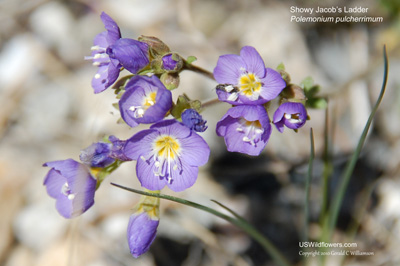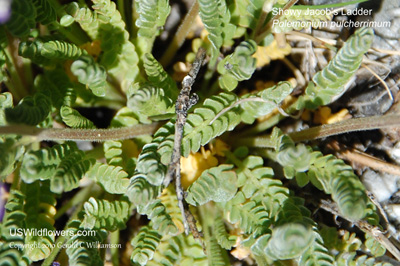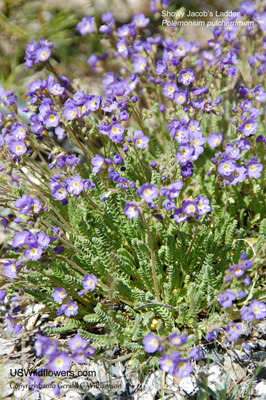Showy Jacob's Ladder, Jacob's Ladder, Skunky Polemonium, Skunkleaf Polemonium - Polemonium pulcherrimum
|
Polemonium pulcherrimum - Showy Jacob's Ladder, Jacob's Ladder, Skunky Polemonium, Skunkleaf Polemonium. I have found varying reports of 20 to 40 species being listed in the Polemonium (Jacob's Ladder) genus worldwide. The USDA Plants Database lists 24 species in the United States, with a species being absent only in four states - Florida, Louisiana, Nebraska, and South Carolina. Of those 24 USDA-listed species, 2 are non-native, and an amazing 12 of them are found only in a single state (although a couple of those are also found in parts of Canada.)
The native North American members of this genus are primarily found in the western half of the continent with the notable exceptions of the relatively rare Vanbrunt's Polemonium (P. vanbruntiae) which protected in 6 of the 7 northeastern states where it is found, and Greek Valerian (P. reptans) which is found in most of the eastern half of the United States and Canada. Polemonium pulcherrimum is found in the twelve westernmost states (exclusive of Hawaii) and in most of western Canada. It is a plant of mid to high elevations.
Found in:
AK, AZ, CA, CO, ID, MT, NM, NV, OR, UT, WA, WY
Leave comments on Polemonium pulcherrimum at this link. | 
Distribution of Polemonium pulcherrimum in the United States and Canada:

Blue=Native; Grey=Introduced
Map from USDA Plants Database:
USDA, NRCS. 2017. The PLANTS Database (http://plants.usda.gov, 08 May 2025). National Plant Data Team, Greensboro, NC 27401-4901 USA.
Search Our Database: Enter any portion of the Scientific, Common Name, or both.
Do a general Google search of the entire site:
#ad
 Follow USWildflowers on Twitter
| | Site: Custer County, ID Date: 2010-June-13 | Photographer: Cindy Williamson
Nikon D40
| | The corolla lobes of Showy Jacob's Ladder are blue or, rarely, white. It is reported that the more open the area where they are growing, the deeper the blue. | | 
| | Site: Custer County, ID Date: 2010-June-13 | Photographer: Cindy Williamson
Nikon D40 | | The yellow central part of the corolla (sometimes white), which extends to the corolla tube, is what sent me away from P. viscosum and toward P. pucherrimum, along with the distribution range. P. viscosum apparently usually has an entirely blue corolla, although I have found a few photos of what is purported to be P. viscosum with the yellow eye. P. viscosum also isn't listed as being found in the two Idaho counties where I photographed it, Boise County, and Custer County. P. viscosum is also a plant of higher elevations - alpine, while P. pucherrimum can also be found in the sub-alpine areas where these photographs were taken. | | Click on the photo for a larger image

| | Site: Custer County, ID Date: 2010-June-13 | Photographer: Cindy Williamson
Nikon D40 | | The compound leaves of Polemonium give the genus the "Jacob's Ladder" common name. Based on the leaves of the plants I found, I initially thought this was P. viscosum, but according to E-Flora BC: Electronic Atlas of the Flora of British Columbia, the leaflets on P. viscosum are divided nearly to their base into 2 to 5 spoon-shaped lobes, giving the leaflets an appearance of being whorled rather than opposing. P. pulcherrimum is frequently glandular-hairy in the inflorescence while the stems are smoother elsewhere. The young leaves are also frequently glandular-hairy. The crushed leaves give off a skunk-like smell. | | Click on the photo for a larger image

| | Site: Custer County, ID Date: 2010-June-13 | Photographer: Cindy Williamson
Nikon D40 | | Most of the compound leaves of Showy Jacob's Ladder are basal, with some much-reduced cauline leaves. The plant grows a bit over a foot tall. | | Click on the photo for a larger image

|
References used for identification and information:
|
|
| |
| #ad
|
|






